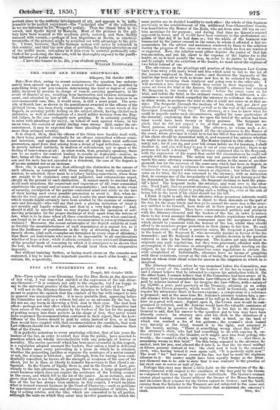THE ORION A.N TO SI BERB SILYFAVRECKS.
Glasgow, 7th October 1860.
.Sea—Now that, owing to ree..ent occurrences, the question has unfortu- _nately been 'maned up anew, your readers would doubtless be gratified by something from your pen towards determining the kind or degree of oulpa- laity incurred b_y persons in charge of vessels carrying passengers, in the event of disaster at sea, resulting from inattention and reckless mismanage- ment, and attended by loss of life. Notwithstanding the late decision in an evenmemorable case, this, it would seem, is still a moot point. The seve- rity of Scotch law, as shown in the punishment awarded to the offioers of the ill-fated Orion, has been freely commented upon; the recent wreck of the "Superb, in arousing public feeling on the subject afresh, having elicited such strictures, as well as anticipations of a much milder decision from the Eng- lish judges, in the case unhappily now pending. It is certainly gratifying to meet with pleadings for mercy, on behalf of men against whom, in the mean time, the current af public feeling rims strong. Still, under the eir- enmstances, it may be expected that these pleadings will be subjected to a more than ordinary scrutiny. It is alleged, then, that the officers of the Orion were harshly dealt with, in their being punished criminally for an offence committed without crimi- nal intention, and against the recurrence of which there meat sufficient guarantees, apart from that arising from a dread of legal infliction,—.namely, in merely natural instincts, in motives of self-interest, not to speak of the feeling of benevolence at all ; in other words, that, generally sneaking, there can be no motive for conduet leading to results so deplorable—motive, in fact, being all the other way. And that the punishment of-Captain Mender- son and his mate has not operated as a deterrent, the case of the Superb is of course pointed out as an instance. Now, Mr, it appears to me, that although the distinction in the nature of
such offences, as compared with those resulting from really . criminal in- tention, be admitted, there must be a fallacy lurking somewhere, when those are sought to be explained away and palliated, and extenuations urged, .simply on the ground of such distmetion. It oannot surely be doubted that, in all such situations, the magnitude and itnpoetssnce of the trust committed constitutes the-ground and measure of responsibility.; and-that, in the event of casualty, exculpation of the parties concerned mustiest solely on the fact of their having used every -possible precaution to avoid it. But, when in- terests the very gravest are at-stake, and results the most disastrous ensue- -which results might -certainly have been averted -by the exercise of ordinary care and-foresight--who-will say that such a glaring infraction of trust is notmorally and legally criminal, and that in a very high degree ? And, should it still be asserted that we may depend upon the operation of self- moving principles for the proper discharge of duty apart from the tenors of daw, what is to be done when all these considerations, even when combined, are found to be of no avail, and duty sorecommended is yet-so pertinaciously violated ? Moreover, -the recent-catastrophe of the Superb -exhibits ut least as forcibly the unsatisfactoriness of cm& dependence as is argued for, as it does the inefficacy -of -punishment in the way of deterring from crime. It -merely shows, (and such examples are furnished by every class of offenders,)
that there -are-individuals-who seem to he inaccessible to all considerations whether of hope or fear ; while it affords certainly a very awkward illustration of-the peculiar mode of reasoning by which it is attempted to be shown that the law, in dealing with such persons, should treat them with comparative impunity. But without insisting farther, or laying much stress-on the remarks now :suggested, el-beg to leave this important question in much abler hands; and


























 Previous page
Previous page